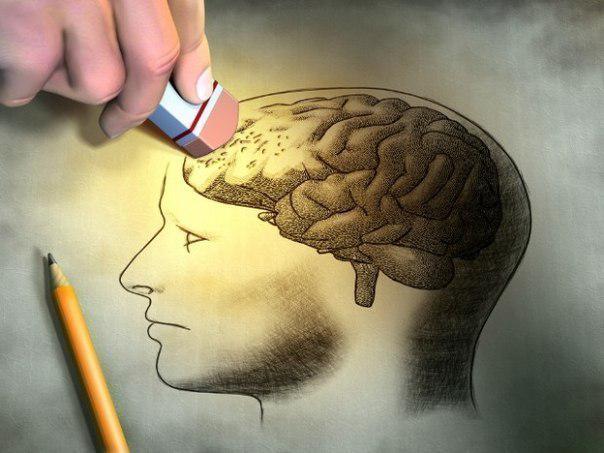5926
20 psychological facts that you did not know about myself

The human psyche is one of the biggest mysteries in the world.
Although researchers have learned a lot of interesting facts about the psychological characteristics of the person, and can even predict our behavior, based on certain rules, much remains unknown.
Did you know how wrong your memories, how long your habits are formed, or the number of friends that you can buy?
These and other psychological facts that will help you learn more about yourself.
Psychological processes of human
1. Do you suffer from "inattention blindness»
This is an example of what is called "inattention blindness". The idea is that we are often blind to what is going on we literally "under the nose" when we are focused on some other task.
In this case, a man in a gorilla suit goes through a group of players, stops and goes. Participants engaged in counting passes, often do not notice the gorilla. Moreover, those who know about the appearance of a gorilla, become even more inattentive and passed other changes (such as change in color of curtains, leaving one girl).
2. You can remember only 3-4 elements simultaneously
There is a rule of "magic number 7 plus or minus 2", according to which a person can not hold more than 5-9 pieces of information simultaneously. Much of the information in short-term memory is stored for 20-30 seconds, and then we quickly forget it, only if you do not repeat again and again.
While most people can keep in mind about 7 digits for a short period, almost all of us hard to keep in mind the 10 digits.
Recent studies show that we are able to store much less: about 3-4 pieces of information simultaneously. Although we try to group the data that we get our short-term memory still remains rather limited.
For example telephone number is divided into several sets of numbers, so that we can remember it easier.
3. We do not take the combination of red and blue
Although these colors are used in many national flags, red and blue color difficult to read our vision when they are next to each other.
This is due to an effect called "hromostereopsis", which leads to the fact that some colors "act", and others are removed. This causes irritation and eye fatigue.
Most of all, this effect is a combination of red and blue as well as red and green colors.
4. You see things differently than they perceive
According to the study, University of Cambridge, "nezhavno in kaokm podyakre rpasoloezhny bkuvy in slvoe. Smaoe vaonzhe it chotby pearvya and ponesdyalya bkuva blyi on svioh Mets ».
Even if the rest of the letters are jumbled, you will be able to read a sentence. This is because the human mind does not read every letter, but the word as a whole. He constantly processes information it receives from the senses and how you perceive information (words) are usually different from what you see (matted letters).
5. You can keep the attention of about 10 minutes
Even if you are in a meeting, you're interested in the topic, and one interesting thing sets, the maximum attention that you are able to maintain it for 7-10 minutes. After that, your attention starts to weaken and you need to take a break, to continue to hold your interest.
Psychological features of human
6. The ability to defer the pleasure comes from childhood
Your ability to delay immediate gratification of their desires arise in early childhood. People who from an early age could postpone pleasure better in school, and better able to cope with stress and frustration.
7. We are committed to dreams of 30 percent of the time
Love in the clouds? According to psychologists, we all love to indulge in dreams, at least 30 percent of the time. Some of us even more, but it's not always a bad thing. The researchers argue that people who love to dream, tend to be more creative and better solve various problems.
8. The habit is formed during 66 days
Scientists studying how long certain actions become a habit, found that our average it takes about 66 days.
The more complex the behavior that we want to buy, the longer the time we need. So, for those who wish to acquire the habit of doing exercise, often required in 1, 5 times longer, so that it becomes automatic, than those who drew up the habit of eating fruit for lunch. Even if you miss a day, go two, it will not affect the time of acquisition of habits, but missed too many days in a row can slow down the process.
9. You overestimate your reactions to future events
We are not very well predict the future. To be precise, we overestimate our response to future events, whether pleasant or negative. Studies have shown that people believe that positive events, such as marriage or the big win will make them much happier than it actually happened. Similarly, we believe that negative events such as job loss or accident, cause we have much more depressed than in reality.
10. You blame the other person, not the situation (and the situation, and not yourself)
Remember when you were waiting for the other person, who was late for a meeting. Most likely, you have explained his delay irresponsibility and nesobrannosti. In the same situation, you wrote off his tardiness on external circumstances (traffic jams).
In psychology, this is called the "fundamental attribution error" - that is, the tendency to blame other people's behavior by internal personality characteristics and their behavior - external factors ("I had no choice," "I had no luck"). Unfortunately, even being aware of our tendency to make unfair judgments, we still continue to make this fundamental mistake.
11. Number of friends that you may have a limited
Even if you can boast of several thousand friends in social networks, in fact they have a lot less. Psychologists and anthropologists have identified "Dunbar's number" - that is, the maximum number of close relationships that a person can have, and it is from 50 to 150.
12. You can not help but pay attention to the food, to the c * kc and the danger
Have you noticed that people always stop to look at the scenes of accidents. In fact, we can not ignore the situation of danger. Each person has an ancient structure of the brain, which is responsible for the survival and asks, "Can I eat it? Can I do this with * HMAC? Could this kill me? ».
Food with * ks and danger - it's all he cared about. After all, people will die without food, without a CSA * kind will not continue, but if a person dies, the first two points will not make sense.
13. Do you know how to do things that have never done before
Imagine that you have never seen the iPad, but you gave him and asked him to read the book. Even before you turn the iPad and begin to use it in your head already is a model of how to read with the help of the book. You will have suggestions on how the book will look like on screen, what functions you can use and how you do it.
In other words, you have a "mental model" of reading books with the tablet, even if you have never done this before. Your mental model is different from the model, which is a person who has read earlier e-book and those who do not know what the iPad.
Our mental models are based on incomplete facts, past experience and even intuitive ideas.
14. You want more choices than you can overpower
If you go into any supermarket, you will find a huge range of products, and all because people need a large variety.
In one study conducted in the supermarket, researchers presented participants 6 kinds of jam, and then 24 kinds of jams. Although people often stayed at the counter with 24 kinds of jam, they are 6 times more likely to buy jam on the counter with 6 kinds of jam.
It is simple: despite the fact that it seems to us as if we want more, our brains can handle only a limited number of items at a time.
15. Are you happy when busy with something
Imagine that you are at the airport and you need to pick up the luggage. In this case, you need about 12 minutes to get to the baggage claim. When you get to the baggage claim belt, you will immediately take away your suitcase. How impatient you feel?
Now try to imagine a similar situation, but once you get to the tape issue for 2 minutes and wait for their luggage 10 minutes. Although in both situations receive the baggage took you 12 minutes in the second case, you probably were more impatient and unhappy.
If a person has no reason to be active, he decides to do nothing. And although it helps us save energy, idleness makes us feel impatient and unhappy.
Brain and mind
16. Most of the decisions you make subconsciously
Although we like to think that all our decisions are carefully monitored and thought, research suggests that everyday decisions are actually subconscious, and it has a reason.
Every second of our brain attack more than 11 million individual pieces of data, and since we can not all this carefully check our subconscious helps us to make a decision.
17. Do you remodel your memories
We take our memories as small "movies" that we lose in our head and we believe that they are stored in the same way as a video in our computer. However, this is not so.
Every time you think back to some event, you change it, because the neural pathways are activated differently each time. This may affect later events, and a desire to fill the gaps in memory. So for example, you do not remember who else was at the meeting of relatives, but because your aunt is usually present, you can over time to include it in your recollection.
18. You can not perform multiple things at once
If you think that a well can perform several things at once, you're wrong. Scientists have proven that we can not do things right once 2-3. Of course, we can go in the same time talk with his friend, but our brain focuses on only one priority function at a particular time. This suggests that we can not think about two different things at the same time.
19. Your most vivid memories are wrong
Memories of exciting and dramatic events in psychology called "vospominaniya- flash" and they turned out to be full of errors.
Notable examples of this phenomenon are the events related to September 11th. Psychologists asked participants to describe in detail what they were doing, where they were and other details associated with this event, immediately after the attack, and after 3 years. It was found that 90 percent of the later descriptions differ from the original. Many people can describe in detail where and what they were doing at the moment when they heard the news. The problem is only that these details are incorrect, as the strong emotions associated with memory, distorted memories.
20. Your brain is also active in his sleep, as during wakefulness
When you are asleep and dreaming, your brain processes and combines the experience of the day, creates associations of the information received, decides what to remember and what to forget. Surely you have often heard the advice to "sleep well" before an exam or important event. If you want to remember that the learned, best go to sleep after you learned the material and before you need to remember that.























